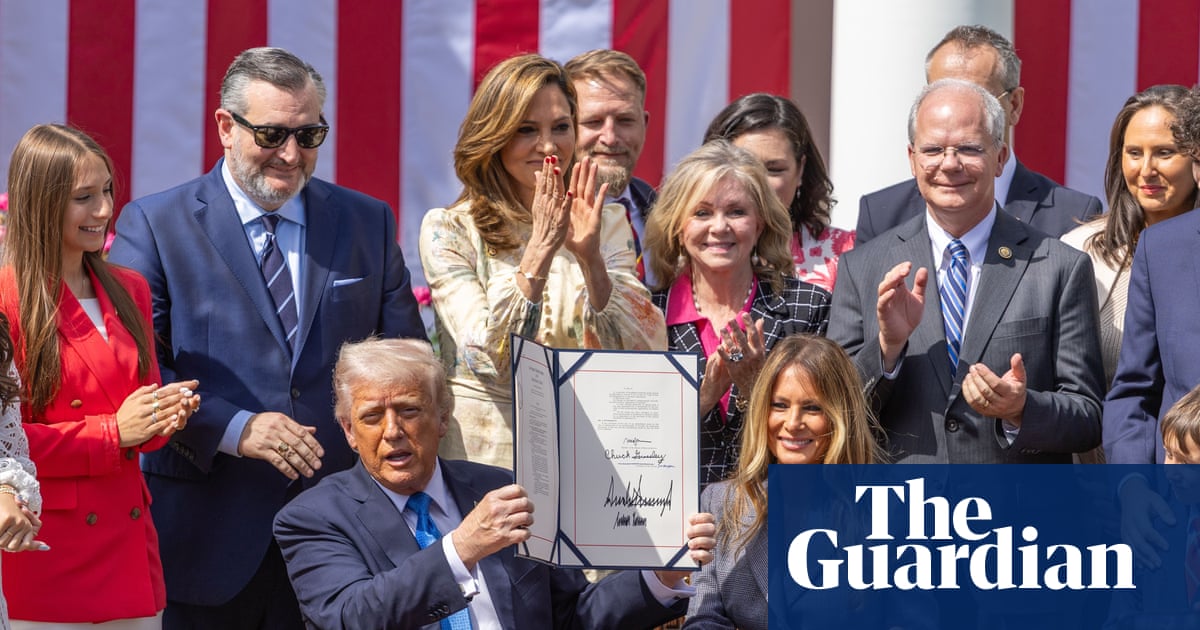President Donald Trump on Monday signed into law the Take It Down Act, a measure that imposes penalties for online sexual exploitation that first lady Melania Trump helped usher through Congress, and he had her sign it, too, despite what sounded like a mild objection on her part.
“C’mon, sign it anyway,” the president told his wife. “She deserves to sign it.”
After she added her signature, the president showed the document bearing both of their names to the audience at the signing ceremony in the White House Rose Garden.
Melania Trump’s signature is merely symbolic because first ladies are not elected and have no formal role in the signing of legislation.
In March, Melania Trump used her first public appearance since resuming the role of first lady to travel to Capitol Hill to lobby House members to pass the bill following its approval by the Senate.
At a signing ceremony, she called the new law a “national victory” that will help protect children from online exploitation, including through the use of artificial intelligence to make fake images.
“AI and social media are the digital candy for the next generation, sweet addictive and engineered to have an impact on the cognitive development of our children,” she said. “But unlike sugar, these new technologies can be weaponized, shape beliefs and, sadly, affect emotions and even be deadly.”
The president said the proliferation of images made using AI means that “countless women have been harassed with deepfakes and other explicit images distributed against their will”. He said what’s happening is “just so horribly wrong”.
“Today, we’re making it totally illegal,” Trump said.
The bill makes it a federal crime to “knowingly publish” or threaten to publish intimate images without a person’s consent, including AI-created “deepfakes”. Websites and social media companies will be required to remove such material within 48 hours after a victim requests it. The platforms must also take steps to delete duplicate content.
Many states have already banned the dissemination of sexually explicit deepfakes or “revenge porn”, but the Take It Down Act is a rare example of federal regulators imposing on internet companies.
The bill, sponsored by Senator Ted Cruz and Congresswoman Maria Elvira Salazar, both Republicans, received overwhelming bipartisan support in Congress, passing the House in April by a 409-2 vote and clearing the Senate by unanimous consent.
But the measure isn’t without critics. Free speech advocates and digital rights groups say the bill is too broad and could lead to censorship of legitimate images, including legal pornography and LGBTQ content. Others say it could allow the government to monitor private communications and undermine due process.
The first lady appeared at a Capitol Hill roundtable with lawmakers and young women who had explicit images of them put online, saying it was “heartbreaking” to see what teenagers and especially girls go through after this happens to them. She also included a victim among her guests for the president’s address to a joint session of Congress the day after that meeting.
After the House passed the bill, Melania Trump said the bipartisan vote was a “powerful statement that we stand united in protecting the dignity, privacy and safety of our children”.
Her advocacy for the bill is a continuation of the Be Best campaign she started in the president’s first term, focusing on children’s well-being, social media use and opioid abuse.
In his speech to Congress in March, the president said he looked forward to signing the bill.
“And I’m going to use that bill for myself, too, if you don’t mind,” he said, adding, that there’s nobody who “gets treated worse than I do online. Nobody.”
